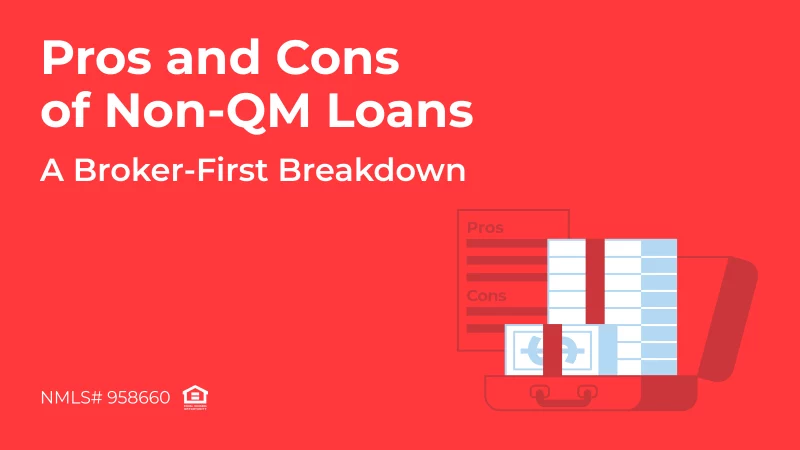Securing mortgage approval can feel like navigating a maze, especially for first-time homebuyers or those rebounding from past rejections. Effective preparation is not just beneficial; it’s essential. This guide explores how to get approved for a mortgage. From credit scores to necessary documentation, we outline strategies to simplify the process and increase approval odds. Whether it’s your first home or overcoming past hurdles, a well-prepared application boosts your chances of approval.
Understand the Mortgage Approval Process
Troubles with a scenario for a borrower?
Message our loan expert and get
a response in 30 minutes.
Submit a Scenario
To understand how to get approved for a mortgage, it’s crucial to start with a clear grasp of the mortgage approval process. This journey involves several key stages, each important in moving you closer to obtaining your home loan. By familiarizing yourself with this process, you can better prepare your application, enhancing your chances for approval.
Step 1: Prequalification
Prequalification is the first step in your mortgage journey. During this phase, you’ll provide your lender with general financial information, such as your income, assets, and debts. This step doesn’t involve an extensive check on your credit report and is primarily used to give you an idea of the mortgage amount you might qualify for. Prequalification can often be done online or over the phone, offering a quick snapshot of where you stand financially in relation to buying a home.
Step 2: Preapproval
Moving beyond prequalification, preapproval is a more in-depth evaluation of your creditworthiness. At this stage, you will need to submit a formal application along with detailed documentation about your finances, including W-2 forms, tax returns, salary details, and information on existing debts. The lender will perform a thorough check on your credit history and score. Getting preapproved is crucial because it means a lender has committed, in principle, to loaning you up to a specified amount, pending final verification of your financials and the property details. Preapproval puts you in a stronger position when you make an offer on a house, showing sellers that you are a serious and qualified buyer.
Step 3: Underwriting
After you have found a home and made an offer that’s been accepted, your mortgage moves into the underwriting stage. This is where lenders take a deep dive into all the documents you have provided. Underwriters will verify your income, assets, debt levels, and inspect the property you wish to purchase to ensure it meets their criteria and justifies the loan amount. They will also ensure that all federal, state, and local guidelines are met. This stage can be the most nerve-wracking part of the mortgage process, as it determines the final approval of your loan.
Step 4: Final Approval and Closing
Once the underwriting is successfully completed, you receive final approval on your loan. The last step is the closing process, where you sign all the necessary paperwork, the loan is funded, and the home officially becomes yours.
By understanding these steps—prequalification, preapproval, underwriting, and closing—you are better equipped to navigate the complexities of the mortgage approval process. Each phase plays a pivotal role in moving you towards homeownership, and being prepared at every step can significantly improve your chances of getting approved for a mortgage.
Improve Your Credit Score
A strong credit score is indispensable in securing mortgage approval, as it reflects your creditworthiness to lenders. The higher your score, the more favorably lenders view your loan application, often leading to better interest rates and terms. Understanding how to improve your credit score is a crucial step in ensuring a smooth mortgage process.
According to data compiled by the CFPB, home buyers with lower credit scores may be restricted from certain types of mortgages or face higher interest rates, which demonstrates the critical role credit scores play in the lending process (The Mortgage Reports). Specifically, conventional loans typically require a minimum credit score of 620, while FHA loans may be available with a score as low as 580 for a lower down payment option.
Why Your Credit Score Matters
Your credit score impacts not just the likelihood of getting approved, but also the terms of the loan itself. A higher score can mean lower interest rates, which translates to lower monthly payments and less paid in interest over the life of the loan.
How to Enhance Your Credit Score
Improving your credit score requires attention to your credit habits and financial discipline. Here are specific, actionable steps you can take:
- Regularly Check Your Credit Report. Errors on your credit report can drag down your score. Obtain a free report from each of the three major credit bureaus (Equifax, Experian, and TransUnion) once a year at AnnualCreditReport.com and check for inaccuracies.
- Pay Your Bills on Time. Your payment history is the most significant factor affecting your credit score. Set up reminders or automate payments to ensure you never miss a due date.
- Reduce Your Credit Utilization Ratio. Aim to use no more than 30% of your total credit limit across all cards. Pay down balances, and if possible, ask for a credit limit increase without increasing your spending.
- Avoid Opening New Credit Lines. New credit applications can cause a temporary dip in your credit score due to hard inquiries. If you’re preparing for a mortgage application, it’s best to avoid new credit cards or loans.
- Handle Debts Strategically. Paying off high-interest and revolving debts first can improve your credit score faster.
Mini Checklist Before Applying for a Mortgage
- Six Months Out. Start monitoring your credit score.
- Four Months Out. Dispute any inaccuracies on your credit reports.
- Two Months Out. Reduce your debt levels, particularly on credit cards.
- One Month Out. Avoid new credit inquiries and maintain stability in your employment and bank accounts.
A representative from the Consumer Financial Protection Bureau (CFPB) notes, “Your credit score, as well as the information on your credit report, are key ingredients in determining whether you’ll be able to get a mortgage, and the rate you’ll pay” (Consumer Financial Protection Bureau).
By following these steps and strategically managing your finances, you can significantly enhance your credit score, thereby boosting your chances of mortgage approval and securing favorable loan terms.
Lower Your Debt-to-Income Ratio
The debt-to-income ratio (DTI) is a crucial metric that lenders use to assess your ability to manage monthly payments and repay debts. Your DTI is calculated by dividing your total monthly debt payments by your gross monthly income, expressed as a percentage. A lower DTI ratio shows lenders that you have a good balance between debt and income, enhancing your chances of securing a mortgage approval.
A study by Freddie Mac found that borrowers with a DTI ratio below 43% are significantly more likely to receive mortgage approvals than those with higher ratios, underlining the importance of maintaining a manageable level of debt.
Why DTI Matters
A lower DTI ratio is favorable in the eyes of lenders as it indicates less risk. Typically, lenders prefer a DTI ratio of 43% or lower, which is considered manageable for most homeowners. A higher DTI can make obtaining a mortgage more challenging, as it suggests a potential struggle in managing monthly payments.
Strategies for Reducing Your DTI
Reducing your DTI involves either decreasing your debt or increasing your income. Here are effective strategies for both:
- Pay More Than the Minimum. Allocate extra funds to paying off debt more quickly, starting with high-interest debts such as credit cards.
- Avoid Taking on New Debt. Hold off on large purchases that would increase your debt load, particularly in the months leading up to your mortgage application.
- Increase Your Income. Consider ways to boost your income, such as seeking a raise, finding additional part-time work, or starting a side hustle.
- Refinance High-Interest Loans. If possible, refinance existing loans to lower interest rates and reduce monthly payments.
To effectively manage your DTI, you should first understand how to calculate it. Use online DTI calculators for an immediate estimate. For ongoing monitoring, budgeting apps can integrate your income and debts to continuously update your DTI ratio. Keeping an eye on this percentage will help you make informed decisions about your finances as you prepare for applying for a mortgage.
By actively working to lower your DTI, you improve not just your eligibility for mortgage approval, but also your overall financial health. Taking these steps can make a significant difference in how lenders view your loan application, leading to more favorable terms and outcomes.
Increase Your Down Payment
Struggling with
a loan scenario?
Get a solution in 30 minutes! Fill out
the short form and get your personal offer
Submit a Scenario
A larger down payment significantly influences the terms of your mortgage approval. By putting more money down upfront, you reduce the loan amount, which can lead to better interest rates, lower monthly payments, and a decreased need for private mortgage insurance (PMI). Lenders view a larger down payment as a sign of financial stability and lower risk, which can make them more willing to offer favorable terms.
Data from the National Association of Realtors indicates that buyers who can offer a down payment of 20% or more are less likely to be subjected to additional scrutiny during the underwriting process, thus facilitating smoother and faster mortgage approvals.
Tips for Saving for a Down Payment
Saving for a down payment requires disciplined budgeting and strategic planning. Here are effective strategies to help you build your down payment fund:
- Set a Target. Determine how much you need to save based on your target home price and desired down payment percentage. A common goal is 20% of the home’s price, but even a 10% down payment can improve your mortgage terms significantly.
- Automate Savings. Set up a separate savings account for your down payment and automate transfers with each paycheck. This ensures consistent savings without the temptation to spend.
- Reduce Expenses. Review your monthly expenditures and identify areas where you can cut back. Consider reducing discretionary spending like dining out, subscriptions, and entertainment.
- Increase Income. Explore ways to boost your income through overtime, freelancing, or a side job. Redirect any extra earnings directly into your down payment savings.
- Utilize Windfalls. Apply any unexpected financial gains, such as tax refunds, bonuses, or gifts, towards your down payment fund.
Using these strategies, along with tools like budgeting apps and financial planning software, can accelerate your savings process. By focusing on increasing your down payment, you improve your chances of mortgage approval and can secure better financial terms on your loan, making your home purchase more affordable in the long run.Top of Form
Gather Essential Documents
Preparing and organizing the necessary documents for a mortgage application is crucial for a smooth approval process. Lenders require detailed information to assess your financial stability and make an informed decision on your loan. Here’s a list of essential documents you will likely need when applying for a mortgage.
- Proof of Income. This includes recent pay stubs, tax returns for the past two years, W-2 or 1099 forms, and additional documentation if you’re self-employed.
- Proof of Assets. Bank statements for checking and savings accounts, investment account statements, and any other assets that demonstrate financial reserves.
- Credit Information. Although lenders will pull your credit report, having information about any debts and monthly payments can be helpful.
- Employment Verification. This might include a recent pay stub, an employment verification letter, or contact information for someone who can confirm your employment.
- Identification. A copy of a government-issued ID, such as a driver’s license or passport.
Tips for Organizing Your Documents
- Start Early. Begin gathering these documents several months in advance to ensure you have everything ready and can address any discrepancies you might discover.
- Keep Records Updated. Make sure all documents are current and reflect your latest financial situation. Regularly update your files as you receive new statements or documents.
- Stay Organized. Use a digital filing system or a dedicated folder to keep physical copies. Label everything clearly and keep a checklist of what you have and what you still need.
- Secure Storage. Protect your documents by storing them in a secure place, whether digitally with encryption or physically in a safe location.
By having all your documents in order and ready to go, you can expedite the mortgage application process and improve your chances of quick and hassle-free approval.
Shop Around for Lenders
Shopping around for mortgage lenders can significantly impact the terms of your loan and overall satisfaction with the home-buying process. Each lender offers different rates, fees, and levels of customer service, so comparing multiple options is crucial to finding the best deal for your situation.
Benefits of Comparing Mortgage Lenders
Comparing different lenders allows you to:
- Secure Better Rates. Even a small difference in interest rates can result in substantial savings over the life of your loan.
- Find Favorable Terms. Some lenders may offer loans with lower fees or more flexible payment options that better fit your financial situation.
- Experience Better Service. Customer service is crucial, especially for first-time homebuyers who may need guidance throughout the process.
Criteria for Selecting a Lender
When selecting a mortgage lender, consider the following criteria:
- Interest Rates and Fees. Look for competitive rates and low fees. Be sure to understand all costs involved, not just the advertised rate.
- Reputation and Reviews. Research online reviews and ask for recommendations from friends or real estate professionals to gauge the lender’s customer service and reliability.
- Loan Options. Ensure the lender offers a loan program that suits your needs, whether it’s a conventional loan, FHA loan, or another type.
- Responsiveness. Choose a lender that is responsive and communicative. You want a lender who will keep you informed and answer your questions promptly throughout the loan process.
By taking the time to shop around and compare lenders based on these criteria, you can enhance your chances of finding a mortgage that suits your financial needs and helps you achieve your homeownership goals.
Consult with a Mortgage Advisor
Consulting with a mortgage advisor is an invaluable step in navigating the complex process of securing a home loan. These professionals offer tailored advice that can simplify decision-making and enhance your understanding of the mortgage landscape.
Benefits of Professional Guidance
- Personalized Advice. Mortgage advisors assess your financial situation and help tailor a loan strategy that best fits your needs and goals.
- Navigating Options. They can help decode various mortgage products and terms, ensuring you understand the differences and benefits of each option.
- Avoiding Pitfalls. Advisors are familiar with common obstacles and challenges in the mortgage process and can provide strategies to avoid them.
- Simplifying the Process. They manage much of the paperwork and interactions with lenders, making the process less stressful and more efficient for you.
Engaging a mortgage advisor early in your home-buying journey can provide peace of mind and a clearer path to obtaining the best possible mortgage terms. Their expertise can be crucial in making informed, confident decisions in your quest for homeownership.
Conclusion
Securing a mortgage can be a streamlined process with the right preparation and knowledge. We’ve discussed essential strategies such as understanding the mortgage approval process, enhancing your credit score, managing your debt-to-income ratio, increasing your down payment, organizing necessary documents, and shopping around for the best lender. Consulting with a mortgage advisor also provides valuable insights tailored to your specific financial situation. Each of these steps plays a critical role in not only improving your chances of mortgage approval but also in ensuring you receive favorable loan terms. Take proactive steps today: review your finances, start improving your credit, and engage with mortgage professionals. By preparing diligently, you can enhance your likelihood of approval and move one step closer to owning your dream home.





